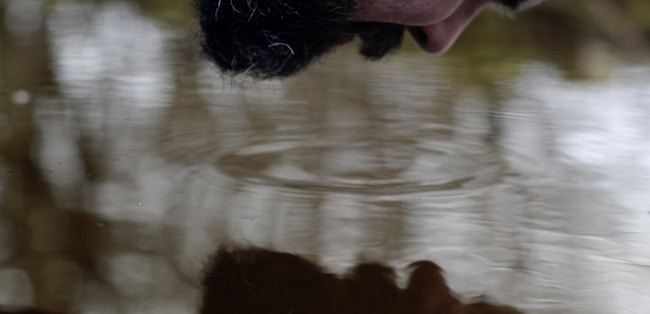Station Island VII (I had come to the edge of the water)
By Seamus Heaney
Read by Marty Rea
I had come to the edge of the water,
soothed by just looking, idling over it
as if it were a clear barometer
or a mirror, when his reflection
did not appear but I sensed a presence
entering into my concentration
on not being concentrated as he spoke
my name. And though I was reluctant
I turned to meet his face and the shock
is still in me at what I saw. His brow
was blown open above the eye and blood
had dried on his neck and cheek. ‘Easy now,’
he said, ‘it’s only me. You’ve seen men as raw
after a football match . . . What time it was
when I was wakened up I still don’t know
but I heard this knocking, knocking, and it
scared me, like the phone in the small hours,
so I had the sense not to put on the light
but looked out from behind the curtain.
I saw two customers on the doorstep
and an old Land-Rover with the doors open
parked on the street, so I let the curtain drop;
but they must have been waiting for it to move
for they shouted to come down into the shop.
She started to cry then and roll round the bed,
lamenting and lamenting to herself,
not even asking who it was. “Is your head
astray, or what’s come over you?” I roared, more
to bring myself to my senses
than out of any real anger at her
for the knocking shook me, the way they kept it up,
and her whingeing and half-screeching made it worse.
All the time they were shouting, “Shop!
Shop!” so I pulled on my shoes and a sportscoat
and went back to the window and called out,
“What do you want? Could you quieten the racket
or I’ll not come down at all.” “There’s a child not well.
Open up and see what you have got—pills
or a powder or something in a bottle,”
one of them said. He stepped back off the footpath
so I could see his face in the streetlamp
and when the other moved I knew them both.
But bad and all as the knocking was, the quiet
hit me worse. She was quiet herself now,
lying dead still, whispering to watch out.
At the bedroom door I switched on the light.
“It’s odd they didn’t look for a chemist.
Who are they anyway at this hour of the night?”
she asked me, with the eyes standing in her head.
“I know them to see,” I said, but something
made me reach and squeeze her hand across the bed
before I went downstairs into the aisle
of the shop. I stood there, going weak
in the legs. I remember the stale smell
of cooked meat or something coming through
as I went to open up. From then on
you know as much about it as I do.’
‘Did they say nothing?” “Nothing. What would they say?’
‘Were they in uniform? Not masked in any way?’
‘They were as barefaced as they would be in the day,
shites thinking they were the be-all and the end-all.’
‘Not that it is any consolation
but they were caught,’ I told him, ‘and got jail.’
Big-limbed, decent, open-faced, he stood
forgetful of everything now except
whatever was welling up in his spoiled head,
beginning to smile. ‘You’ve put on a bit of weight
since you did your courting in that big Austin
you got the loan of on a Sunday night.’
Through life and death he had hardly aged.
There always was an athlete’s cleanliness
shining off him, and except for the ravaged
forehead and the blood, he was still that same
rangy midfielder in a blue jersey
and starched pants, the one stylist on the team,
the perfect, clean, unthinkable victim.
‘Forgive the way I have lived indifferent—
forgive my timid circumspect involvement,’
I surprised myself by saying. ‘Forgive
my eye,’ he said, ‘all that’s above my head.’
And then a stun of pain seemed to go through him
and he trembled like a heatwave and faded.
Credits
Directed by Matthew Thompson.
Part of the second Coole Park Poetry Series, co-produced with Druid and curated by Colm Tóibín.
"Station Island VII (I had come to the edge of the water)" by Seamus Heaney, from Station Island, published by Faber and Faber Ltd. All rights reserved.
